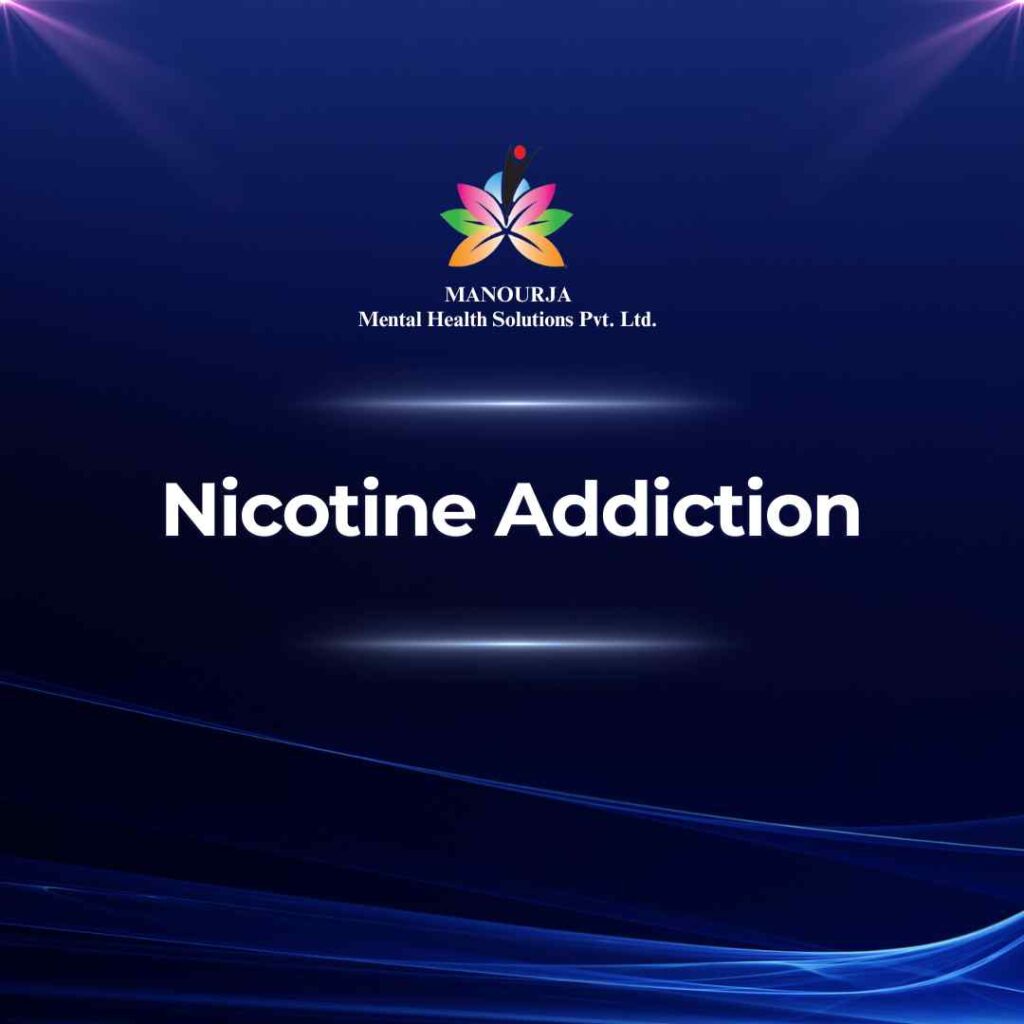Nicotine Addiction

Nicotine Addiction encompasses a range of conditions stemming from the excessive use of nicotine-containing products, such as cigarettes, cigars, smokeless tobacco, and e-cigarettes.
Here’s a breakdown of its meaning, characteristics, forms, and treatment.
Meaning
Nicotine-related disorder refers to a group of conditions characterized by the compulsive use of nicotine products despite negative consequences on physical health, mental well-being, and social functioning. It is recognized as a mental health disorder in diagnostic classification systems such as the DSM-5 (Diagnostic and Statistical Manual of Mental Disorders, 5th edition).
Symptoms
- Compulsive use: Individuals with nicotine-related disorder often find it difficult to control their use of nicotine products, leading to frequent and excessive consumption.
- Cravings: Strong urges or cravings to use nicotine, which can be triggered by environmental cues, stress, or social situations.
- Tolerance: Over time, individuals may develop a tolerance to nicotine, requiring higher doses to achieve the desired effects.
- Withdrawal symptoms: When attempts are made to reduce or quit nicotine use, individuals may experience withdrawal symptoms such as irritability, anxiety, depressed mood, difficulty concentrating, increased appetite, and sleep disturbances.
- Continued use despite harm: Despite being aware of the negative health consequences associated with nicotine use (e.g., increased risk of cancer, heart disease, respiratory problems), individuals with nicotine-related disorder continue to use nicotine products.
Forms
- Nicotine dependence: Characterized by a physical and psychological reliance on nicotine, leading to compulsive use and withdrawal symptoms upon cessation.
- Nicotine withdrawal: Occurs when individuals abruptly stop or reduce nicotine use, leading to a range of physical and psychological symptoms.
- Nicotine use disorder: Refers to a pattern of problematic nicotine use, including tolerance, withdrawal, unsuccessful attempts to quit or cut down, and interference with daily functioning.
Treatment
- Behavioral interventions: Cognitive-behavioral therapy (CBT), motivational interviewing, and other behavioral therapies can help individuals identify triggers for nicotine use, develop coping strategies, and build skills to resist cravings and manage withdrawal symptoms.
- Pharmacotherapy: Medications such as nicotine replacement therapy (e.g., patches, gum, lozenges), bupropion, and varenicline may be prescribed to reduce cravings and withdrawal symptoms and increase the likelihood of successful cessation.Support groups: Participating in support groups like Nicotine Anonymous or seeking support from friends, family, or healthcare professionals can provide encouragement and accountability during the quitting process.
- Comprehensive cessation programs: Structured programs that combine behavioral interventions, pharmacotherapy, and support services offer a holistic approach to addressing nicotine-related disorder and increasing the likelihood of long-term success in quitting.
Overall, treatment for Nicotine Addiction aims to address both the physical and psychological aspects of addiction, helping individuals overcome dependence on nicotine and improve their overall health and well-being.
At MANOURJA, we believe in the transformative power of counseling. Our experienced therapists offer a safe and supportive space where you can explore your thoughts, emotions, and challenges. Through personalized counselling sessions, we’ll work together to develop coping strategies, build resilience, and achieve lasting positive change. Discover the path to a healthier, happier you with MANOURJA counselling services.
MANOURJA Rehabilitation Services
At MANOURJA, we’re dedicated to helping you in rebuild your life, after difficult times. Our rehabilitation services focus on understanding what you need to move forward, whether you’re recovering from addiction, trauma, or any psychological – social challenges. We create personalized plans, that are all about helping you, regain your strength and find hope again. With a caring team by your side, you’ll have the support to make real progress and take steps toward a brighter, healthier future
